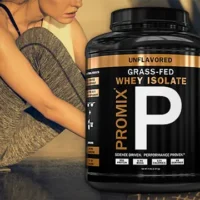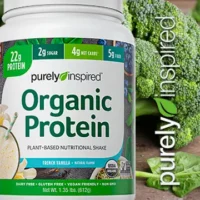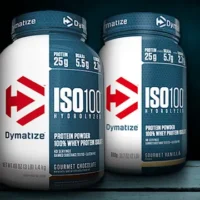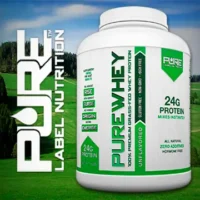Ingredientsprotein ingredient glossary
Acacia gumGum arabic
Acacia gum, a natural soluble fiber derived from the Acacia Senegal tree, is a common thickener, emulsifier, stabilizer, and prebiotic in protein powders.
Acesulfame potassiumAcesulfame, Acesulfame K, Ace K
Acesulfame potassium (Ace-K) is a calorie-free artificial sweetener used in protein powders, commonly combined with other sweeteners, with a sweeter taste than sugar.
Agave InulinChicory inulin, Agave fructan
Agave inulin is a soluble fiber extracted from the blue agave plant, used in protein powders as a natural sweetener with a lower glycemic index than sugar.
Algal oilAlgae oil, DHA oil
Algal oil, derived from algae, is added to protein powders as a plant-based source of omega-3 fatty acids, commonly EPA and DHA, essential for cognitive function and overall health.
Alkalized cocoa powderDutch-processed cocoa, Alkalized cocoa
Alkalized cocoa powder is a cocoa powder that has been treated with an alkalizing agent to reduce its acidity. It is often used in protein powders to add a chocolatey taste, particularly in vegan or plant-based protein powders.
AlluloseD-psicose, D-allulose
Allulose is a low-calorie sweetener found naturally in some fruits. It's used as a natural alternative to sugar or artificial sweeteners in protein powders to enhance taste without adding extra calories.
Alpha-galactosidaseBeano, Alpha-galactosidase enzyme
Alpha-galactosidase is an enzyme that breaks down complex carbohydrates found in beans, lentils, and other foods. It can improve digestion and absorption of protein in protein powders, especially for those with difficulty digesting certain carbs.
Amaranth flourAmaranth grain, Pseudo-cereal
Amaranth flour is made from a gluten-free pseudocereal and is rich in protein, fiber, iron, magnesium, and calcium. It's added to protein powders as a plant-based protein source and to boost the nutritional profile.
Aminogen
Aminogen is a blend of digestive proteases added to protein powders and supplements. It is claimed to enhance protein digestion and absorption, reduce bloating, and improve muscle recovery and growth.
Ammonium bicarbonateBaking ammonia
Ammonium bicarbonate is a leavening agent used in baking to help dough or batter rise. In protein powders, it's used as a processing aid or pH adjuster to maintain desired texture and flavor.
Amylase
Amylase is an enzyme found in the human body and in various foods, and is added to protein powders to improve the digestibility and absorption of carbohydrates.
Anhydrous caffeineCaffeine powder
Anhydrous caffeine, a powdered form of caffeine used to increase energy and focus, is sometimes added to protein powders to enhance athletic performance.
Apple fiberApple pomace fiber, Apple peel fiber
Apple fiber is a soluble fiber derived from apples that can help regulate digestion and promote feelings of fullness. It is commonly added to protein powders to improve texture and nutritional content.
ArabinogalactanLarch arabinogalactan
Arabinogalactan, a complex carbohydrate found in plants, is used in protein powders due to its potential immune-enhancing properties, ability to stimulate beneficial gut bacteria, and support digestive health.
Arrowroot powderArrowroot starch, Maranta arundinacea
Arrowroot powder, a gluten-free and low-calorie alternative to other thickening agents, is commonly used in the food industry and as an ingredient in some protein powders and supplements.
Artificial flavor
Artificial flavors are synthetic chemicals created in a lab to mimic natural flavors and enhance the taste of protein powders.
Ascorbic acidVitamin C, L-ascorbic acid
Ascorbic acid, or vitamin C, is a water-soluble vitamin found naturally in fruits and vegetables. It acts as an antioxidant, aids in collagen synthesis, and enhances iron absorption.
Ascorbyl palmitateVitamin C ester, Ascorbyl palmitate ester
Ascorbyl palmitate is a fat-soluble form of vitamin C used as an antioxidant and preservative in food and supplements to protect cells from free radical damage and prevent spoilage.
AspartameAPM, N-(L-alpha-Aspartyl)-L-phenylalanine 1-methyl ester
Aspartame, a low-calorie artificial sweetener, is used in protein powders, diet sodas, and other food and beverage products. It is made up of two amino acids and is approximately 200 times sweeter than sugar.
Astragalus root extractMilkvetch root, Huang Qi
Astragalus root extract is commonly used in traditional Chinese medicine and is believed to have immune-boosting properties. It may reduce inflammation, improve heart function, and enhance immune system function.
The content on this site has not been written, reviewed or endorsed by a medical professional. We assume no liability for the misuse of supplements and recommend you review the label of any product, as well as consulting with your health care professional.
We are a participant in the Amazon Services LLC Associates Program, an affiliate advertising program designed to provide a means for us to earn fees by linking to Amazon.com and affiliated sites.
We are a participant in the Amazon Services LLC Associates Program, an affiliate advertising program designed to provide a means for us to earn fees by linking to Amazon.com and affiliated sites.
© 2025 ProteinPowder.com




